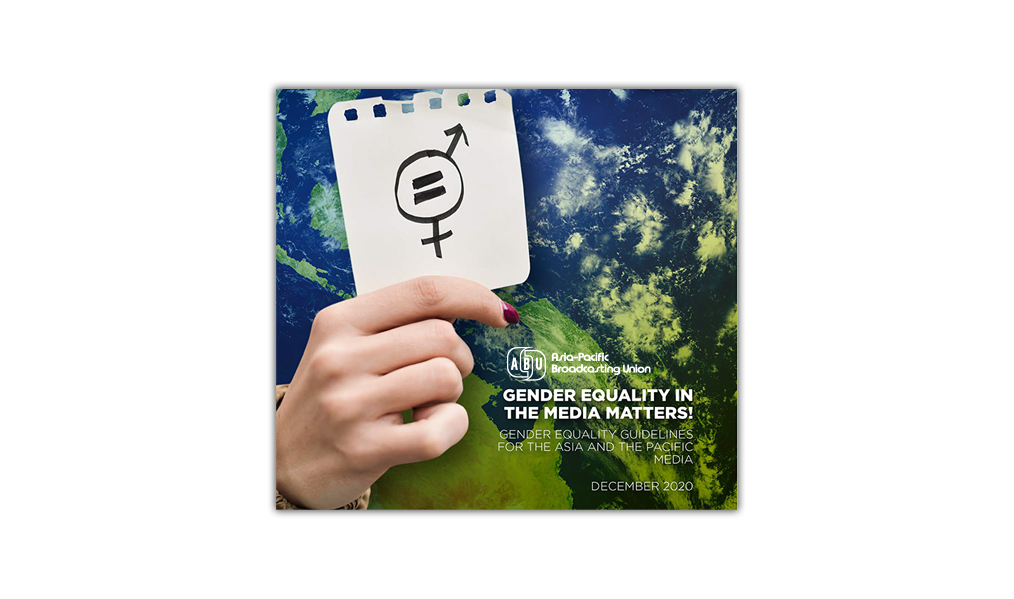
ABU Family Celebrates International Women’s Day
The ABU continues to bring innovative and practical solutions to empower the media in the Asia-Pacific through projects focused on gender equality, diversity and inclusion across all areas of their business and output.
Across the world, media connects people, tells stories, reflects cultures and provides information and services. Through its content, vision, sound, print and digital platforms, broadcasters and other media providers can make a difference to bring communities together, address discrimination, highlight societal issues and present content that reflects the members of all of the communities. This includes focussing on, and representing everyone, including by gender – women and men, girls and boys.
Diversity and inclusion helps media organisations to enhance their business case, content and services through a broader range of perspectives; meeting charters and legislative provisions and community expectations; promoting a positive workplace culture and flexibility in the workplace; enhancing audience experience, connections, appeal and growth; provide fairer, more respectful and accurate coverage and portrayal in content; and making a difference by telling all the stories and reflecting a range of faces, voices, issues and perspectives across content and platforms.
Over the last year the ABU outreach campaign Broadcasting for All moved up a gear with a practical roadmap for gender equality in — and through, the media. In partnership with UNESCO, two milestone projects were accomplished at the end of 2020 under the title THE MEDIA MAKING A DIFFERENCE THROUGH DIVERSITY AND INCLUSION.
“Media Strategy for Gender Equality in Employment and Content in Asia – Pacific” is a first-time initiative, which surveyed nearly 20 ABU broadcast member organisations to assess existing policies and practices on gender equality and diversity and inclusion. This is the beginning of a long-term effort undertaken by ABU to compile data about the status quo in its membership. Such data is almost non-existent and vital to plan for future work in mainstreaming gender and diversity in organisational policy and broadcast content.
The survey provided a snapshot of the gender, diversity and inclusion landscape of participating Asia-Pacific broadcasters and helps to identify what is currently in place and what are the gaps that can be addressed by developing tailored and relevant diversity and inclusion plans, policies and activities. It produces baseline data and benchmarks for determination and implementation of potential initiatives and the opportunity for further data collection and analysis to measure progress in this important area.
Four of the surveyed organisations developed tailored Diversity and Inclusion pPans with clear objectives and strategies, realistic timeframes, performance indicators and monitoring and evaluation processes. The ABU members who developed Diversity and Inclusion Plans are Fijian Broadcasting Corporation; RRI, Indonesia; VBTC, Vanuatu and VOV, Vietnam. Radio Republik Indonesia is launching in March the implementation of their Diversity and Inclusion Plan with the support of ABU.
The second major partnership of the ABU and UNESCO, which was completed at the end of 2020, was the adaptation of the the European Broadcasting Union’s All Things Being Equal Gender Equality Guidelines from Public Service Media (launched in 2019).
The ABU Guidelines Gender Equality in the Media Matters! are specifically aimed at the media in the Asia and Pacific region with the overall focus being on the media workplace.This valuable resource was developed to enable media organizations to work towards gender equality – detailed actions and case studies in the Guidelines provide a roadmap – addressing leadership, planning, communication, data and representation, fair pay, and conditions of service.
In addition, workplace culture plays an important role in achieving sustainable organizational change in the important area of diversity and inclusion. The Guidelines outline the context and practical steps of managing culture change and highlight how to foster an overarching positive work environment. Workplaces can lead the way with strategies and tips for addressing stereotypes, discrimination, harassment and bullying; supporting all employees with their work and life balance commitments with fair and flexible leave provisions and flexible work arrangements; and engaging all staff, men and women, in working together to bring about change and a fairer and more inclusive workplace environment for all.
Throughout the Guidelines, the context, data and case studies specifically reflect the Asia and the Pacific region, individual countries and broadcasters. Themes and initiatives are considered within the context that ‘one size doesn’t fit all’, and that particularly in the Asia and Pacific region, there are marked differences across the area in regard to where countries and media organizations are up to, on their gender equality and diversity and inclusion journey. Many factors come into play, with differing economic, societal, governmental and cultural influences, as well as size and coverage. In 2020, the global pandemic caused world-wide disruption and distress, with the media playing a crucial role to communicate and report on the issues, spread, control measures and ongoing state of play within their countries and externally.
The one unifying consideration in regard to gender equality is that the media can make a difference within their own workplace by having a structured plan in place, with achievable goals and actions – guiding them on their way to building a fairer place to work, based on gender equality and one that embraces diversity and inclusion.
ABU members and the media generally, are encouraged to promote the Guidelines within their organizations, distribute to key stakeholders and managers, and consider using the ideas and case studies to further enhance gender equality in the workplace, through structured planning, policies and initiatives.
For more information about the ABU Broadcasting for All projects, please contact the Head of ABU SG Office, Ms Natalia Ilieva at natalia@abu.org.my

